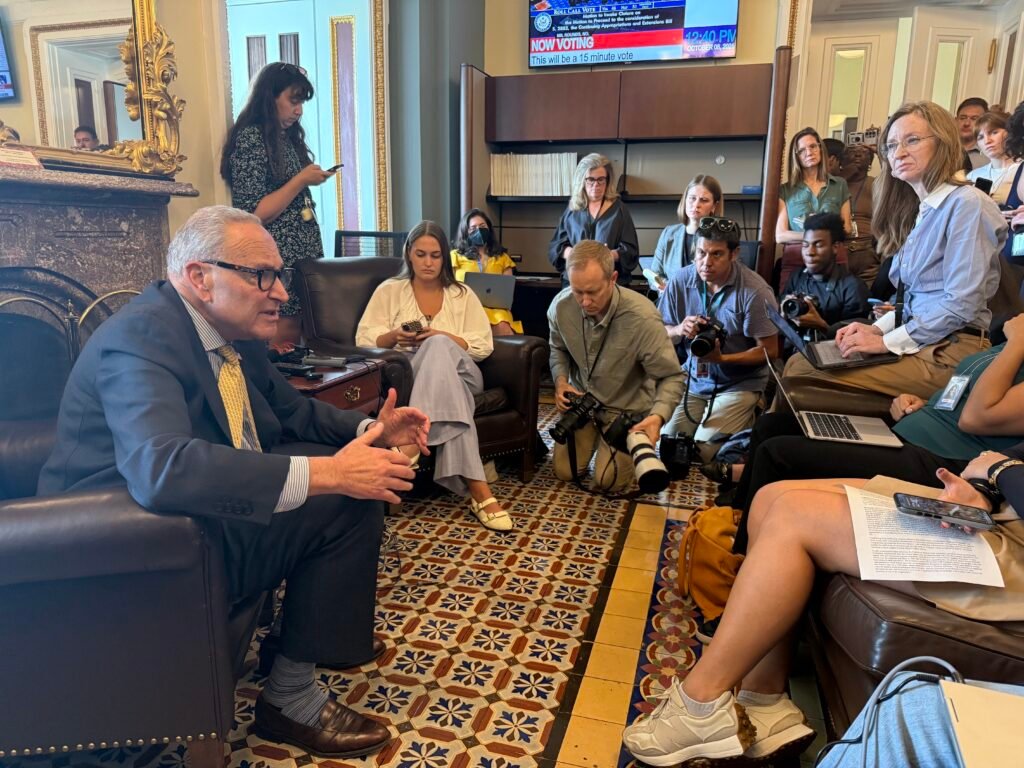WASHINGTON — Congress has just a week to resolve the deadlock and secure government funding, or active-duty military personnel risk missing their first paychecks due to the ongoing government shutdown. Subsequent to that, federal civilian workers and legislative staff will also face delayed payments, a situation that typically escalates pressure on both Democrats and Republicans to find a solution.
However, as of Wednesday, progress remains elusive. For the sixth time, the Senate could not advance a Republican short-term funding bill, and Democrats were unable to gather enough support for their alternative proposal. The Republican bill received a 54-45 vote, while the Democratic version fell short at 47-52, both lacking the requisite 60 votes needed to advance in the Senate.
Notably, Senators Catherine Cortez Masto of Nevada and John Fetterman of Pennsylvania, along with independent Senator Angus King of Maine, sided with Republicans on the funding bill, while Senator Rand Paul from Kentucky opposed it.
The shutdown commenced on October 1, marking the beginning of the federal government’s fiscal year for 2026.
Trump Shows Some Flexibility on Military Pay
House Speaker Mike Johnson (R-Louisiana) dismissed the idea of a separate bill to ensure pay for military personnel during the shutdown, insisting that Democrats should support a stopgap spending bill if they wish to keep federal employees funded. “They made their choice. The House has done what it needed to do. Now, it’s up to the Senate,” Johnson stated during a morning press conference. “We’ve taken our vote, and the outcome is clear.”
Later in the day, President Trump diverged from Republican leadership, suggesting a standalone bill for military pay could still be in play. “It’s a long road ahead, but we’ll address it,” he remarked, adding, “A week feels like forever; we’ll ensure our troops are taken care of.”
Johnson, meanwhile, seemed to firmly negate that option. The Trump administration does not plan to pay furloughed federal workers retroactively, which a 2019 law typically mandates.
Johnson acknowledged the legal expectations regarding compensation for federal employees but hinted at other legal nuances he hadn’t had the chance to explore yet. His stance remained clear: federal employees deserve to be paid.
As President Trump publicly criticized Democrats for their handling of unemployment issues for federal workers, he claimed that most would eventually receive back pay but mentioned some might not qualify due to their ties with the Democratic Party.
The resolution to the shutdown likely hinges on Congress discussing vital policy matters, especially regarding the enhanced tax credits related to health insurance through the Affordable Care Act (ACA), which are due to expire soon.
Democrats have voiced the need for a deal ahead of a potential early vote on a Republican stopgap spending bill slated to keep the government funded through November 21. Yet, Republican leaders insist they won’t entertain negotiations until Democrats agree to reopen the government.
“We cannot hold the federal government hostage.”
Senate Minority Leader John Thune, R.S.D., mentioned the readiness of Republicans to meet with Democrats to discuss tax credits but emphasized that these conversations could only occur after the government reopens. “There are indeed mutual interests at stake, particularly in healthcare,” Thune noted, adding that the stopgap bill is essential for allowing both chambers to finalize various funding agreements that were meant to be settled by the fiscal year’s start.
Senate Majority Leader Chuck Schumer pointed out the rifts among Republicans concerning healthcare, suggesting they are inclined to sidestep a public debate surrounding ACA tax credits. Georgia Republican Representative Marjorie Taylor Greene expressed her dismay at the prospect of rising health insurance premiums, stating that immediate action is vital.
Schumer responded by encouraging more Republicans to heed her warnings, stressing the need for serious negotiations to reopen the government and maintain ACA premiums.
Trump’s Stance on Shutdown Impacts
The longer lawmakers remain unyielding, the more severe the ramifications of the government shutdown become. Trump’s approach seems to be separating the current funding issues from similar past failures.
He indicated he could potentially dismiss numerous federal employees or halt funding for approved projects in Democratic regions. Speculation remains about whether furloughed federal workers will receive back pay.
Details concerning potential layoffs could be firmed up soon, following a federal judge’s order for the Trump administration to provide specifics regarding troop reductions and affected agencies.
Senator Lisa Murkowski, R-Alaska, part of a bipartisan group engaged in informal talks, emphasized that reopening the government is a prerequisite for substantive discussions about ACA tax credits. “We need the government open first,” she noted, while also affirming that dialogue is ongoing, albeit quietly.
When asked about Republicans’ chances of securing a vote for ACA tax credit extensions, North Carolina Republican Senator Thom Tillis anticipated an extended shutdown and encouraged Democratic senators to support efforts to reopen the government. He pointed out that many Democrats may find themselves in precarious positions regarding re-election, facilitating talks on government funding.
Senator Markwayne Mullin, R-Oklahoma, remarked that discussions have stalled but emphasized ongoing communication. Meanwhile, Senator Mike Rounds, R-South Dakota, mentioned that, despite a lack of concrete dialogue, there had been an informal bipartisan gathering. “It’s critical to stress the urgency of ending the shutdown so we can return to constructive Senate work afterward,” he concluded.







